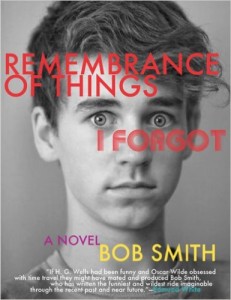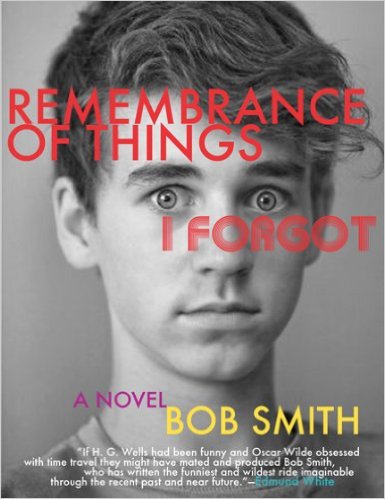 Remembrance of Things I Forgot: A Novel
Remembrance of Things I Forgot: A Novel
by Bob Smith
Wisconsin / Terrace Books. 272 pages, $26.95
FOLLOWING two memoirs and a first-rate debut novel, Selfish and Perverse (2007), comedian Bob Smith’s second novel, Remembrance of Things I Forgot, will surely thrill the author’s many fans. Here it may well prove resistant to a brief summary; and few works of fiction require a greater suspension of disbelief.
Smith’s narrator is again an amiable drifter. Comic book dealer John Sherkston resolves to end his relationship with his all too alpha partner Taylor Esgard, a physicist, chiefly because of Taylor’s drift into the politics of the Right. However, his decision coincides with Taylor’s professional breakthrough moment. He has long been working on a time machine for the U.S. government. The year is 2006, and his current boss is none other than Dick Cheney. Taylor prepares to show Cheney and John how the machine works—but happenstance has John embark on a journey back to 1986, alone. He quickly runs into his younger self (“Junior”), and he’s relieved to find how well they get along. Soon they’re in league with the younger Taylor, and the three commit to a madcap cross-continental road adventure, with twin purposes. First, they plan to alert John’s sister to her future depression and eventual suicide in the hope of preventing it; and they contrive to frame George W. Bush in a way that will stop him from becoming president.
Cheney has mastered time travel too, however, and is soon in pursuit of our heroes, diabolically bent on preventing their political intervention. One comical subtext of the novel lies in John’s inability to persuade anyone in 1986 that “President Bush” is a serious possibility. Other humorous moments relate to the technological gulf dividing the two generations: the 1986-ers are of course clueless about the importance of the Internet and struggle to appreciate the imminent ubiquity of the cell phone. More darkly, they find the prospect of the 9/11 attacks ludicrous and fantastical.
It is not the case, however, that the mid-80’s finds the U.S. at large a happy place. Space is given over to the unraveling horrors of the AIDS epidemic and especially to Reagan’s silence on the subject. Cheney lets slip that—as we now suspect—the then president’s Alzheimer’s had kicked in much earlier than was initially conceded.
Remembrance of Things I Forgot is a beautifully written and well-paced comic sci-fi extravaganza, a true page turner yet pregnant with deep social and human insight. It is, as the title indicates, replete with references to the gay literary canon, though Smith’s primary objective—like Nabokov’s, with Lolita, a half-century before—is to play off the comical juxtaposition of America’s inheritance of European models of culture and its mass-market, one-size-fits-all embrace of the hackneyed, the undistinguished, and the (addictively) predictable: “Cookies are my weakness, my Achilles’ meal. I’d always thought a characteristic difference between old- and new-world eating habits was that in Europe a writer eats one madeleine and recalls his past while Americans wolf down a package of Double Stuf Oreos to forget the present.”
Curiously, then, the wit and ingenuity that Smith displays here argue against his narrator’s premise. No European author would have dared to write this novel, what with its lampooning of still-living members of the recent political governing elite. There’s the full-on, hilarious, and chilling characterization of Cheney (lawyers must have checked this and that) and the hapless, philandering, failed oil magnate and drunkard George W. Bush, who is (almost) framed by being photographed in flagrante with a bunch of rednecks with hard-ons.
True, the notion of Americans having a poor recall of even the recent past is confirmed in the novel by the many times John makes a wrong judgment about his earlier self. And the world he inhabits seems, from the standpoint of 2006, extraordinarily naïve. John also keeps trying to invoke people, places, and events from the intervening twenty years, to the bewilderment of his 1986 listeners.
Conversely, some things surprise John about his younger self, such as his interest in buying a fuel-efficient car, which “will help stop global warming.” Older John reflects: “Had there really been over twenty years of inaction? It angered me that global warming had been acknowledged as a front-page threat to our planet in 1985 and yet our country had done absolutely nothing to stop it. It made me disgusted with myself and everyone else.” Take this book to heart: it will absorb you, change you, and—in the clincher of the last sentence—move you to tears.
________________________________________________________
Richard Canning’s edition of Ronald Firbank’s Vainglory is out from Penguin Classics in November.






